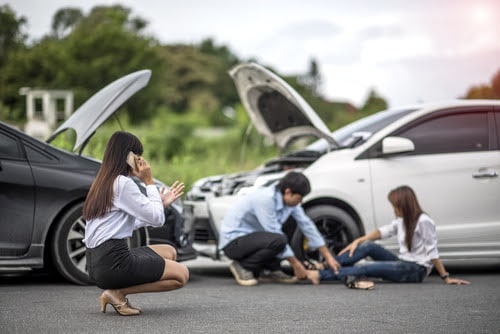Does the profession you have increase your risk of being in a car crash? It might, according to one study. The statistics of this study are considered so valid, that many insurance companies use them to determine how much a person’s auto insurance rates should be.
In order from highest risk to lowest, the top 10 professions are:
- Ticket/Membership Sales: Percentage of drivers with a prior incident: 43.09 percent
- Fitness Club Manager: Percentage of drivers with a prior incident: 39.88 percent
- Production Crew: Percentage of drivers with a prior incident: 38.63 percent
- Bartender: Percentage of drivers with a prior incident: 38.41 percent
- Chiropractor: Percentage of drivers with a prior incident: 38.06 percent
- Welder: Percentage of drivers with a prior incident: 37.75 percent
- Metalworker: Percentage of drivers with a prior incident: 37.57 percent
- Masseuse: Percentage of drivers with a prior incident: 37.3 percent
- Journalist/Reporter: Percentage of drivers with a prior incident: 37.28 percent
- Sales Representative: Percentage of drivers with a prior incident: 36.97 percent
Certain factors can contribute to a higher risk, such as jobs that require more time on the road. Another factor that strongly stood out was that high-demand professions could affect the hours of sleep a person gets, increasing the risk of fatigued driving.
Damages in a Car Crash
If you have been injured in a crash caused by another driver, you may be able to pursue a claim for financial damages. Although each case is determined by the circumstances of the crash, in general, victims of vehicle accidents may be entitled to compensation for the following:
Economic Damages
These are the tangible, measurable losses that have a monetary value. They typically include:
- Medical Expenses: This includes the costs of medical treatment, hospital stays, surgeries, medications, rehabilitation, and any other medical services required as a result of the accident.
- Lost Wages: If the injured party is unable to work due to the accident, they may be entitled to compensation for the income they would have earned during the recovery period.
- Loss of Earning Capacity: In cases where the injuries result in a long-term or permanent disability that affects the injured party’s ability to earn a living, they may be entitled to compensation for the reduced earning capacity.
- Other Financial Losses: This may include out-of-pocket expenses related to the accident, such as transportation costs for medical appointments or assistance with daily living activities.
Non-Economic Damages
These are the intangible losses that are more subjective and do not have a direct monetary value. They can include:
- Pain and Suffering: Compensation for physical pain, emotional distress, and mental anguish caused by the accident and resulting injuries.
- Loss of Enjoyment of Life: If the injuries have significantly impacted the injured party’s ability to engage in activities they once enjoyed, they may be entitled to compensation for the loss of quality of life.
Punitive Damages
In certain situations where the defendant’s actions were particularly reckless or intentional, the court may award punitive damages to punish the defendant and deter similar conduct in the future. Punitive damages are meant to go beyond compensating the injured party and serve as a form of punishment.
If you have been injured in a crash, a Virginia Beach personal injury attorney can meet and discuss with you what damages may apply in your case and how he or she can help. Call Shapiro, Washburn & Sharp to schedule a free and confidential case evaluation.
